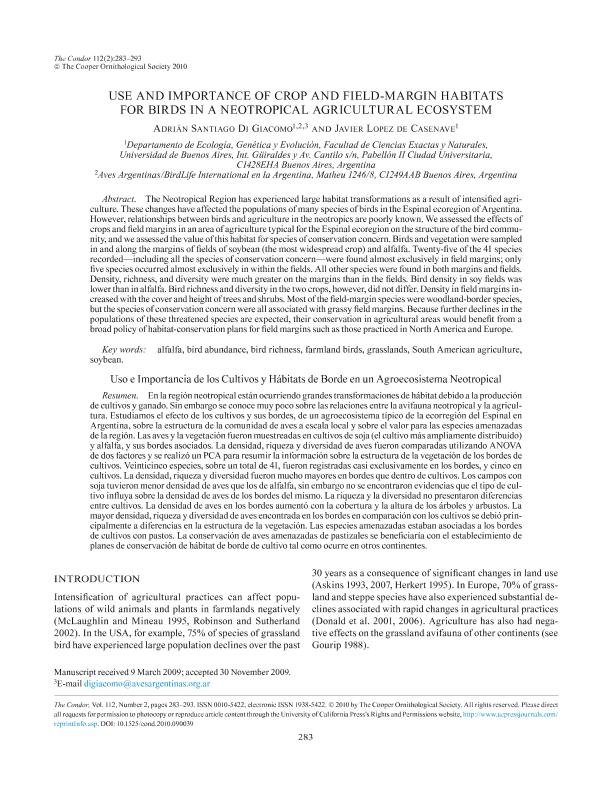Mostrar el registro sencillo del ítem
dc.contributor.author
Di Giacomo, Adrian Santiago

dc.contributor.author
Lopez de Casenave, Javier Nestor

dc.date.available
2019-01-28T18:13:32Z
dc.date.issued
2010-05
dc.identifier.citation
Di Giacomo, Adrian Santiago; Lopez de Casenave, Javier Nestor; Use and importance of crop and field-margin habitats for birds in a Neotropical agricultural ecosystem; Oxford University Press; The Condor; 112; 2; 5-2010; 283-293
dc.identifier.issn
0010-5422
dc.identifier.uri
http://hdl.handle.net/11336/68769
dc.description.abstract
The Neotropical Region has experienced large habitat transformations as a result of intensified agriculture. These changes have affected the populations of many species of birds in the Espinal ecoregion of Argentina. However, relationships between birds and agriculture in the neotropics are poorly known. We assessed the effects of crops and field margins in an area of agriculture typical for the Espinal ecoregion on the structure of the bird community, and we assessed the value of this habitat for species of conservation concern. birds and vegetation were sampled in and along the margins of fields of soybean (the most widespread crop) and alfalfa. Twenty-five of the 41 species recorded-including all the species of conservation concern-were found almost exclusively in field margins; only five species occurred almost exclusively in within the fields. All other species were found in both margins and fields. Density, richness, and diversity were much greater on the margins than in the fields. bird density in soy fields was lower than in alfalfa. bird richness and diversity in the two crops, however, did not differ. Density in field margins increased with the cover and height of trees and shrubs. most of the field-margin species were woodland-border species, but the species of conservation concern were all associated with grassy field margins. because further declines in the populations of these threatened species are expected, their conservation in agricultural areas would benefit from a broad policy of habitat-conservation plans for field margins such as those practiced in North America and Europe.
dc.format
application/pdf
dc.language.iso
eng
dc.publisher
Oxford University Press

dc.rights
info:eu-repo/semantics/openAccess
dc.rights.uri
https://creativecommons.org/licenses/by-nc-sa/2.5/ar/
dc.subject
Alfalfa
dc.subject
Bird Abundance
dc.subject
Bird Richness
dc.subject
Farmland Birds
dc.subject
Grasslands
dc.subject
South American Agriculture
dc.subject
Soybean
dc.subject.classification
Otras Ciencias Biológicas

dc.subject.classification
Ciencias Biológicas

dc.subject.classification
CIENCIAS NATURALES Y EXACTAS

dc.title
Use and importance of crop and field-margin habitats for birds in a Neotropical agricultural ecosystem
dc.type
info:eu-repo/semantics/article
dc.type
info:ar-repo/semantics/artículo
dc.type
info:eu-repo/semantics/publishedVersion
dc.date.updated
2019-01-25T13:40:18Z
dc.journal.volume
112
dc.journal.number
2
dc.journal.pagination
283-293
dc.journal.pais
Reino Unido

dc.journal.ciudad
Oxford
dc.description.fil
Fil: Di Giacomo, Adrian Santiago. Universidad de Buenos Aires. Facultad de Ciencias Exactas y Naturales. Departamento de Ecología, Genética y Evolución; Argentina. Aves Argentinas; Argentina. Consejo Nacional de Investigaciones Científicas y Técnicas; Argentina
dc.description.fil
Fil: Lopez de Casenave, Javier Nestor. Universidad de Buenos Aires. Facultad de Ciencias Exactas y Naturales. Departamento de Ecología, Genética y Evolución; Argentina. Consejo Nacional de Investigaciones Científicas y Técnicas. Oficina de Coordinación Administrativa Ciudad Universitaria. Instituto de Ecología, Genética y Evolución de Buenos Aires. Universidad de Buenos Aires. Facultad de Ciencias Exactas y Naturales. Instituto de Ecología, Genética y Evolución de Buenos Aires; Argentina
dc.journal.title
The Condor

dc.relation.alternativeid
info:eu-repo/semantics/altIdentifier/doi/https://doi.org/10.1525/cond.2010.090039
dc.relation.alternativeid
info:eu-repo/semantics/altIdentifier/url/https://academic.oup.com/condor/article/112/2/283/5152548
Archivos asociados
